

I just came across Sam Kriss‘s review of Justin E.H. Smith‘s The Internet is Not What You Think It Is: A History, Philosophy, a Warning.
Here is a taste:
…there are ways in which the internet really does seem to work like a possessing demon. We tend to think that the internet is a communications network we use to speak to one another—but in a sense, we’re not doing anything of the sort. Instead, we are the ones being spoken through. Teens on TikTok all talk in the exact same tone, identical singsong smugness. Millennials on Twitter use the same shrinking vocabulary. My guy! Having a normal one! Even when you actually meet them in the sunlit world, they’ll say valid or based, or say y’all despite being British. Memes on Instagram have started addressing people as my brother in Christ, so now people are saying that too. Clearly, that name has lost its power to scatter demons.
Everything you say online is subject to an instant system of rewards. Every platform comes with metrics; you can precisely quantify how well-received your thoughts are by how many likes or shares or retweets they receive. For almost everyone, the game is difficult to resist: they end up trying to say the things that the machine will like. For all the panic over online censorship, this stuff is far more destructive. You have no free speech—not because someone might ban your account, but because there’s a vast incentive structure in place that constantly channels your speech in certain directions. And unlike overt censorship, it’s not a policy that could ever be changed, but a pure function of the connectivity of the internet itself. This might be why so much writing that comes out of the internet is so unbearably dull, cycling between outrage and mockery, begging for clicks, speaking the machine back into its own bowels.
This incentive system can lead to very vicious results. A few years ago, a friend realized that if she were murdered—if some obsessed loner shot her dead in the street—then there were hundreds of people who would celebrate. She’d seen similar things happen enough times. They would spend a day competing to make exultant jokes about her death, and then they would all move on to something else. My friend was not a particularly famous or controversial person: she had some followers and some bylines, but probably her most divisive article had been about tax policy. But she was just famous enough for hundreds of people, who she didn’t know and had never met, to hate her and want to see her dead. It wasn’t even that they had different political opinions: plenty of these people were on the same side. They would laugh at her death in the name of their shared commitment to justice and liberation and a better future for all.
Maybe these were simply bad people, but I’m not so sure. There’s an incident I think about a lot: back in 2019, a group of bestselling authors in their 40s and 50s decided to attack a young college student online for the crime of not liking their books. Apparently wanting to read anything other than YA fiction means that you’re an agent of the patriarchy. The student was, of course, a woman. So what? Punish her! For a while they whipped up thousands of people in sadistic outrage. Even her university joined in. But then, the tide suddenly shifted, and one by one they were forced to apologize. ‘I absolutely messed up. I will definitely do better and be more mindful moving forward. I made a mistake.’ Of course, these apologies weren’t enough. The discourse was unanimous: we want you to grovel more; we want to see you suffer. Was absolutely everyone involved making the same personal moral lapse? Or could it be that they’d all plugged their consciousnesses into a planet-sized sigil that summons demons?
Back when I spent half my days on social media, I did much the same thing. I would probably have also celebrated a murder, if the victim had once tweeted something I didn’t like. Now, looking back on those days is like trying to remember the previous night through a terrible hangover. Oh god—what have I done? Why did I keep saying things I didn’t actually believe? Why did I keep behaving in ways that were clearly cruel and wrong? And how did I manage to convince myself that all of this was somehow in the service of the good? I was drunk on something. I wasn’t entirely in control.
Read the entire review at Damage.